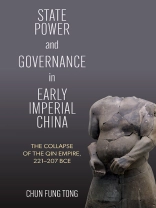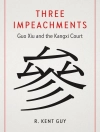State Power and Governance in Early Imperial China delves into the governance and capacity of the state by providing an empirical historical study of the collapse of China’s Qin Empire. In contrast to the popular view that the Qin fell suddenly and dramatically, this book argues that the collapse was rooted in persistent structural problems of the empire, including the serious resource shortages experienced by local governments, inefficient communication between administrative units, and social tensions in the new territories. Rather than reducing Qin rulers to heartless villains who refused to adjust their policies and statecraft, this book focuses on the changes that the regime did make to meet these challenges. It reveals the various measures that Qin rulers devised to solve these problems, even if they were ultimately to no avail. The paradox of the Qin Empire seemed to be that, although the regime’s policies and reforms could theoretically have strengthened the state’s power and improved the governance of the empire, their ramifications simultaneously exacerbated the misfunction of local governments and triggered the military failures that eventually destroyed the empire.
Daftar Isi
List of Illustrations
Acknowledgments
Conventions
Introduction
1. Toward a Theory of the Qin Collapse
2. State Ideology and Social Tensions in the Qin Empire
3. Territorial Expansion and Personnel Shortages in Local Governments
4. Inefficient Logistics of State Power and Communication Gaps in the New Territories
Conclusion: Gaps in State Power: The Structural Problem and the Fall of the Qin Empire
Notes
Bibliography
Index
Tentang Penulis
Chun Fung Tong is Assistant Professor at the School of Chinese, the University of Hong Kong.












